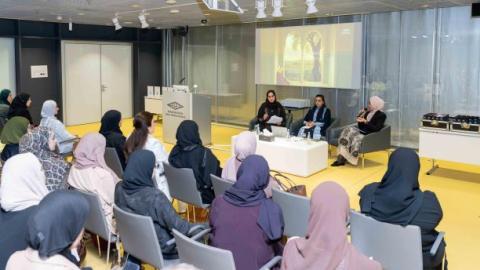
World-renowned artists delivered a series of talks at Qatar National Library, tracing women’s contributions to enriching Islamic art throughout the past centuries. The lectures shed light on various topics including the role of women in developing a tradition of librarianship during the Ottoman era, and how female artists during the time of the Mughal Empire advanced calligraphy and manuscript development.
The day-long event, entitled “The Arts of the Book in the Islamic World and the Role of Women’’, was one of the events organized by the Library in celebration of International Women’s Day. Visitors at the full day event learned about the creative role that women have played in the evolution of Islamic book art, the most fundamental element of Islamic art, including calligraphy, illumination, and miniature painting.
Dr. Sabiha Göloğlu, a post-doctoral fellow at the Museum for Islamic Art in Berlin; Dr. Veeda Ahmed, a famous Pakistani painter; Dr. Mehreen Chida-Razvi, Art Historian and Research Associate at the Department of History of Art and Archaeology at the School of Oriental and African Studies (SOAS); Dr. Marika Sardar, Curator of South Asian Art at the Museum of Islamic Art in Qatar; Anita Chowdry, artist, freelance educator and researcher; and Khadiga El Ghawas, a renown graffiti artist , shared their insights on the topic at the event.
Dr. Sabiha discussed how royal women, or sultanas, during the period of Ottoman Empire, promoted both libraries and a culture of reading across communities: “In the nineteenth century, Ottoman royal women had an important role in the dissemination and recitation of prayer books in public and private spheres. Prayer books were owned by prominent women and endowed to libraries and recited in mosques. On the occasion of International Women's Day, it is particularly stimulating to present a paper at Qatar National Library, a place where several Ottoman manuscripts and a collection on women are housed.”
In an informative talk, Dr. Marika stressed the importance of learning from women’s historical achievements, and using their work to advance contemporary art: “Women in this region have always played prominent roles in all areas, and contributed significantly to enriching art, literature and science. We should use their work available in libraries across the world, and Qatar National Library in particular, to advance in-depth research into these fields.”
Qatar-based miniature artist, Sumaira Aamer, who attended the event, said: “Such events at the Library will contribute to reviving the dying art of miniature. I thank the Library for organzing such an interesting event to appreciate women’s work in the art scene. By highlighting women’s achievements, the Library is raising awareness of women’s important role in every dimension of the society. These events are also important for the art of hand drawing to stay relevant, which is a skill that should be promoted among the youth.”
“The speakers highlighted how women actively participated in their societies across the Gulf region, Central and South Asia. The presentations were incredibly enlightening and provided interesting information about how women promoted knowledge, art and book writing,” said Sabika Shaban, an art enthusiast attending the event.







